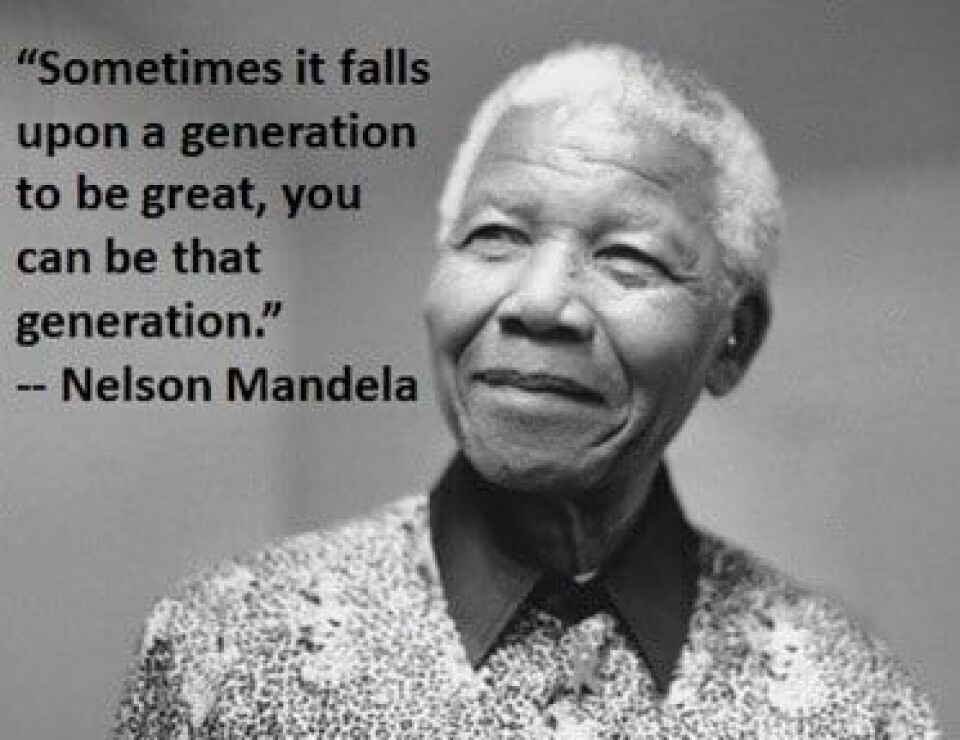Copyright : Re-publication of this article is authorised only in the following circumstances; the writer and Africa Legal are both recognised as the author and the website address www.africa-legal.com and original article link are back linked. Re-publication without both must be preauthorised by contacting editor@africa-legal.com
Young Lawyers to be Featured in New Africa Legal Series

Africa’s instinct for good relationships and its youthful population sets it apart. In a new series Africa Legal examines how young lawyers are breathing life into old systems across the continent.
Africa’s most famous lawyer, Nelson Mandela, understood better than anyone the power of the youth when he said: “Young people are capable, when aroused, of bringing down the towers of oppression and raising the banners of freedom.”
International Youth Month in August is a reminder of Mandela’s vision and, for law students and young lawyers, what he said is especially poignant. This is because the great man equipped himself, when he was young, with a law degree and went into practice with the single-minded goal of challenging and changing the apartheid state.
It is with Mandela’s words in mind that Africa Legal will, in coming months, host a series of interviews with young lawyers from across the continent.
These interviews will focus on individual stories of success and examine what motivates people living in Africa to study law or work in legal services.
The articles will be published on the Africa Legal website and circulated to mainstream media in an effort to inspire and support legal education.
Africa Legal founders Scott Cowan and Wendy Bampton believe the success of any tech-driven platform is through involving law students and young lawyers.
“A major driver of what we do is telling the stories of the people who make a difference in the lives of others. What we are finding, and what is so inspiring, is that many of the people we are featuring are young, extremely well educated and highly innovative. This is a continent that is alive and growing and it’s the lawyers who are leading the way,” says Bampton.
For Cowan it is this combination of youth and good relationships that sets Africa’s legal community apart from its global counterparts.
“As we grow our platform and speak to people across Africa we are finding that relationships are the core of every interaction. By marrying this with the youth and tech-savvy ability of the people we meet we are creating a virtual network that links lawyers in Lagos, Accra, Kampala, Dar es Salaam, Nairobi, Johannesburg and Cape Town,” Cowan says.
To show their commitment to legal education, Africa Legal is the main sponsor of the University of Cape Town Moot Court competition. This is where student lawyers showcase their powers of argument to their peers and professors but also recruiting firms. It’s a concept that Bampton says can be expanded across the continent through virtual communication.
“A pan-African Moot Court event is doable with technology and out-the-box thinking. Yes, there are different legal systems, but the issues are the same.”
The Africa Legal team also supports Legal’s Week’s African Legal Awards which takes place in Johannesburg. “Again, we want to show our commitment to excellence by investing in an event that recognises Pan African talent,” Bampton said.
The platform has already featured a host of rising legal stars this year, including:
- Viola Llewellyn, the Cameroonian-British entrepreneur who has developed a new way of capitalizing small to medium African businesses through a fin-tech mobile phone concept that has brought Japanese and European investment into the heart of poor communities with huge success.
- Nelson Ashitiva, lead partner in an award-winning Kenyan law firm who established the business with a $150 loan from his mother, using a table in a restaurant called Bugger Dom to meet clients.
- Oxford University doctoral student in law, Onoriode Reginald Aziza, who is researching regional securities law in sub-Saharan Africa.
- Clarice Wambua, a Kenya-based expert in climate change law
- Kem Ihenacho, a partner at Latham and Watkins in London who, alongside Clement Fondufe, is head of the firm’s Africa practice.
- Catherine Kariuki, partner and head of telecommunications, media and technology at TripleOKLaw Advocates LLP in Nairobi, who is an expert in GDPR.
Dr Melba Kapesa Wasunna, director of the Extractives Baraza at the Strathmore University Law School, said in an interview with Africa Legal journalist, Carol Campbell, that it was widely recognised in Africa that training lawyers was critical to the future of good governance in every country. “Through everything, I strive to embed Africa in what I do and how I teach. I want our future lawyers to understand the context of the work they do and the responsibility that comes with it,” she says.
It is this ethos that Africa Legal is supporting and embracing.
“This is the beginning of a massive database of African legal expertise and a network that will soon be unmatched,” said Bampton.
“The time has come for Africa’s legal community and especially its law students and young lawyers to work together and, by doing this, create new channels for major investment,” says Cowan. “This is what Africa Legal is all about – taking what is so wonderful in Africa – the humanness of good relationships, applying the energy of youth with tech and creating a resource where everyone benefits.”
Re-publication of this article is authorised only in the following circumstances; the writer and Africa Legal are both recognised as the author and the website address www.africa-legal.com and original article link is included. A bio can be provided on request.
Re-publication without reference to Africa Legal is not authorised.
